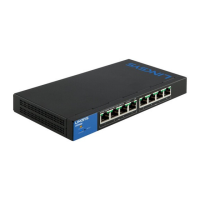98
Table of Contents
Linksys
Table of Contents
Linksys
Chapter 15 Maintenance
This section describes how to view system information and configure various
options on the device.
It covers the following topics:
• Reboot
• File Management
• Diagnostics
Device Models
All models can be fully managed through the web-based switch
configuration utility. GE is the naming convention used for Gigabit Ethernet
(10/100/1000) ports.
In Layer 2 system mode, the device forwards packets as a VLAN-aware bridge.
Reboot
Restore Factory Defaults
Some configuration changes, such as enabling jumbo frame support, require the
system to be rebooted before they take effect. However, rebooting the device
deletes the Running Configuration, so it is critical that the Running Configuration
is saved to the Startup Configuration before the device is rebooted. Clicking
Apply does not save the configuration to the Startup Configuration.
You can back up the device configuration by using Maintenance > File
Management > Configuration File Copy or clicking Save at the top of the
window. You can also upload the configuration from a remote device.
System Modes
STEP 1 Click Maintenance > Reboot.
STEP 2 Enter the following fields:
• Restore to Factory Defaults—Select to reboot the device by using
the factory default configuration. This process erases the Startup
Configuration file and the backup configuration file.
STEP 3 Click Apply and Reboot. The parameters are copied to the Running
Configuration file and the stack is rebooted.
File Management
This section describes how system files are managed. The following topics are
covered:
• Overview
• Firmware & Boot Code
• Active Firmware Image
• Configuration & Log
• Configuration File Copy
Overview
System files are files that contain configuration information, firmware images
or boot code.
Various actions can be performed with these files, such as: selecting
the firmware file from which the device boots, copying various types of
configuration files internally on the device, or copying files to or from an
external device, such as an external server.
The possible methods of file transfer are as follows:
• Internal copy.
• HTTP/HTTPS that uses the facilities that the browser provides.
• TFTF client, requiring a TFTP server.
Configuration files on the device are defined by their type, and contain the
settings and parameter values for the device.
When a configuration is referenced on the device, it is referenced by
its configuration file type (such as Startup Configuration or Running
Configuration), as opposed to a file name that can be modified by the user.
Content can be copied from one configuration file type to another, but the
names of the file types cannot be changed by the user.
Other files on the device include firmware, boot code, and log files, and are
referred to as operational files.

